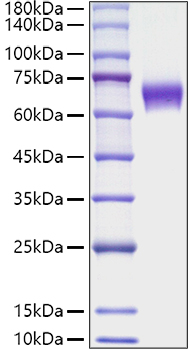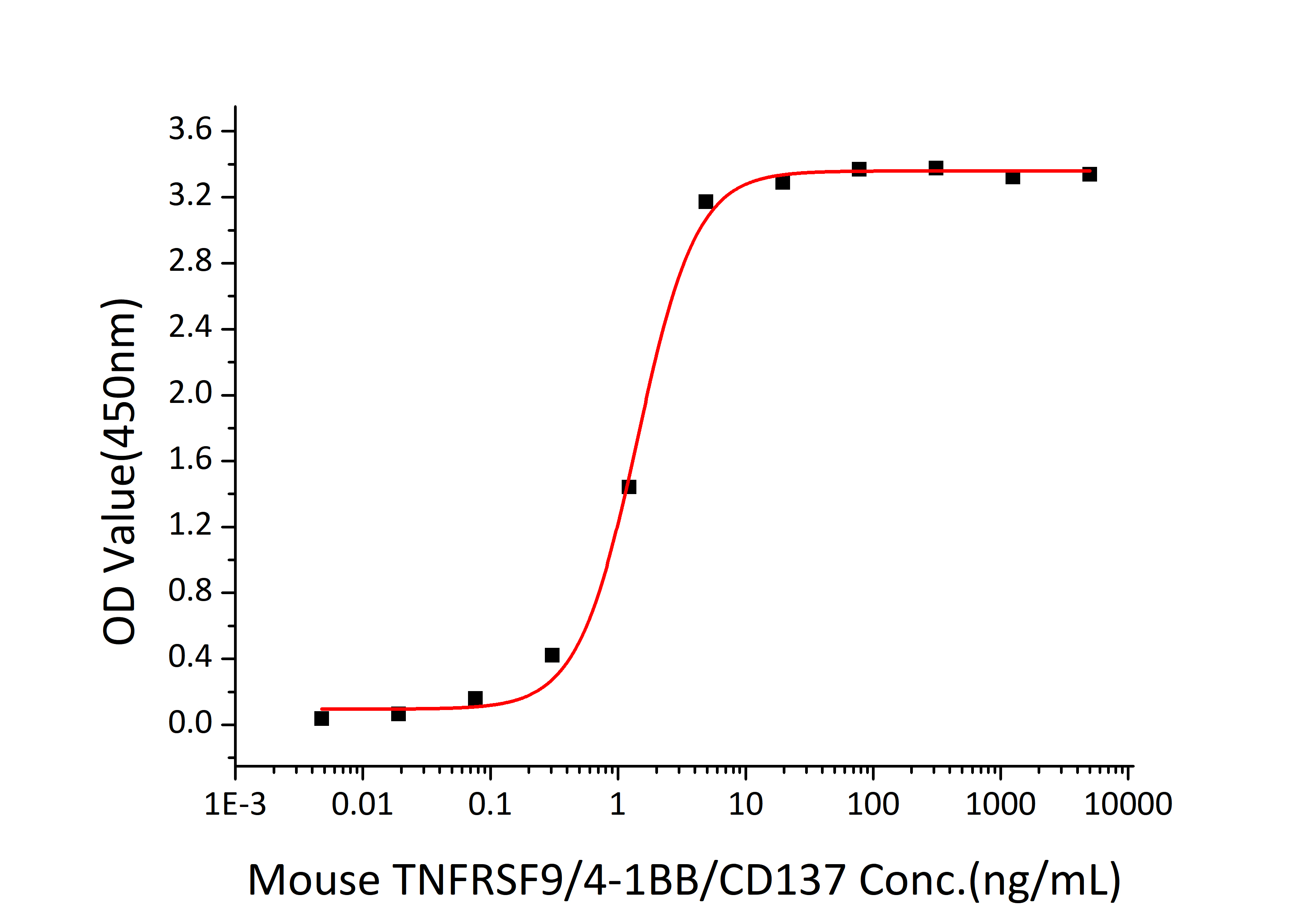Description
Recombinant Mouse TNFRSF9/4-1BB/CD137 Protein
The Recombinant Mouse TNFRSF9/4-1BB/CD137 Protein is a high-quality recombinant protein designed for murine biological research applications. This protein serves as an essential reagent in mouse model studies, comparative immunology research, and preclinical therapeutic evaluations, enabling scientists to investigate TNFRSF9/4-1BB/CD137 biology and its relevance to human disease mechanisms through translational research approaches.
This product (SKU: RPCB1633) is produced using HEK293 cells and features a C-hFc tag for convenient detection and purification. The protein exhibits a calculated molecular weight of 46.03 kDa with an observed molecular weight of 60-70 kDa under denaturing conditions, achieving ≥ 95 % as determined by SDS-PAGE.. Functional bioactivity has been validated through rigorous quality control assays, confirming its suitability for demanding research applications.
Key Features
| High Purity by Affinity Chromatography | |
| Mammalian & Bacterial Expression Systems | |
| High lot-to-lot consistency via strict QC |
| Product Name: | Recombinant Mouse TNFRSF9/4-1BB/CD137 Protein |
| SKU: | RPCB1633 |
| Size: | 10 μg , 20 μg , 50 μg , 100 μg |
| Reactivity: | Mouse |
| Synonyms: | 4-1BB , CD137 , CDw137 , ILA, TNFRSF9, 4-1BB , CD137 , CDw137 , ILA, TNFRSF9 |
| Tag: | C-hFc |
| Expression Host: | HEK293 cells |
| Calculated MW: | 46.03 kDa |
| Observed MW: | 60-70 kDa |
| Gene ID: | 21942 |
| Protein Description: | High quality, high purity and low endotoxin recombinant Recombinant Mouse TNFRSF9/4-1BB/CD137 Protein (RPCB1633), tested reactivity in HEK293 cells and has been validated in SDS-PAGE.100% guaranteed. |
| Endotoxin: | < 1 EU/μg of the protein by LAL method. |
| Purity: | ≥ 95 % as determined by SDS-PAGE. |
| Formulation: | Lyophilized from a 0.22 μm filtered solution of PBS, pH 7.4. |
| Bio-Activity: | Measured by its binding ability in a functional ELISA. Immobilized Mouse TNFSF9(RPCB0775) at 5μg/mL (100 μL/well) can bind Mouse TNFRSF9/4-1BB/CD137 (RPCB1633) with a linear range of 0.005-1.41 ng/mL. |
| Reconstitution: | Centrifuge the vial before opening. Reconstitute to a concentration of 0.1-0.5 mg/mL in sterile distilled water. Avoid vortex or vigorously pipetting the protein. For long term storage, it is recommended to add a carrier protein or stablizer (e.g. 0.1% BSA, 5% HSA, 10% FBS or 5% Trehalose), and aliquot the reconstituted protein solution to minimize free-thaw cycles. |
| Storage: | Store at -20℃.Store the lyophilized protein at -20℃ to -80 ℃ up to 1 year from the date of receipt. After reconstitution, the protein solution is stable at -20℃ for 3 months, at 2-8℃ for up to 1 week. |
CD137 (also known as 4-1BB) is a surface co-stimulatory glycoprotein originally described as present on activated T lymphocytes, which belongs to the tumor necrosis factor (TNF) receptor superfamily. It is expressed mainly on activated CD4+ and CD8+ T cells, and binds to a high-affinity ligand (4-1BBL) expressed on several antigen-presenting cells such as macrophages and activated B cells. Upon ligand binding, 4-1BB is associated with the tumor necrosis factor receptor–associated factors (TRAFs), the adaptor protein which mediates downstream signaling events including the activation of NF-kappaB and cytokine production. 4-1BB signaling either by binding to 4-1BBL or by antibody ligation delivers signals for T-cell activation and growth, as well as monocyte proliferation and B-cell survival, and plays an important role in the amplification of T cell-mediated immune responses.








